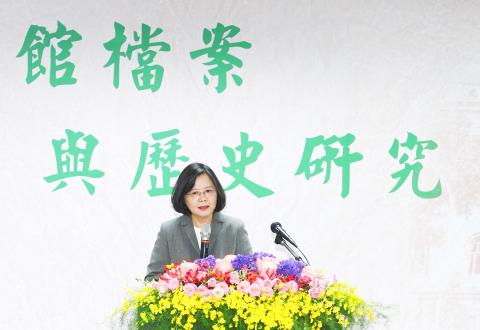President Tsai Ing-wen (蔡英文) yesterday said that her administration would continue work to declassify old government records as part of its transitional justice efforts.
Tsai made the remarks at the opening of a symposium hosted by the Academia Historica in Taipei.
Declassifying old government records is not just for transitional justice, but it also befits the government’s “open government” ideals and allows public access to government information, Tsai said.

Photo: CNA
While the Academia Historica is tasked with managing presidential and vice presidential records and artifacts, Tsai said that the Academia Historica belongs to the public, and that academics and members of the public are welcome to make use of archived documents so that with critical analysis of historical truth, there can be a more diverse explanation of the nation’s history.
Tsai applauded the Academia Historica under the leadership of president Wu Mi-cha (吳密察) for having swiftly compiled 260,000 documents for online publication.
“Without the limitation of time and space, members of the public and researchers can freely browse the archive, which is of great help to the development of research on history,” Tsai said of the institute’s publication in April of formerly confidential government archives dating to Chiang Kai-shek’s (蔣介石) regime.
The files, accessible on the institution’s archive at http://ahonline.drnh.gov.tw, were uploaded in several batches between January and April after being individually reviewed between August and December last year.
The collection includes documents related to the Northern Expedition — a Chinese Nationalist Party (KMT) campaign led by Chiang against local warlords in China from 1926 to 1928; the Second Sino-Japanese War; Taiwan-China unification plans and government suppression of civil strife, the institute said.
The collection includes manuscripts, electronic documents, letters, books, maps, photographs and other articles, the institute said, adding that they represent 98.8 percent of all existing documents related to Chiang.
The remainder includes items that cannot be posted due to copyright restrictions (0.74 percent) and some that are restricted due to privacy concerns (0.44 percent), while 0.02 percent are permanently confidential to protect intelligence sources, it said.

Alain Robert, known as the "French Spider-Man," praised Alex Honnold as exceptionally well-prepared after the US climber completed a free solo ascent of Taipei 101 yesterday. Robert said Honnold's ascent of the 508m-tall skyscraper in just more than one-and-a-half hours without using safety ropes or equipment was a remarkable achievement. "This is my life," he said in an interview conducted in French, adding that he liked the feeling of being "on the edge of danger." The 63-year-old Frenchman climbed Taipei 101 using ropes in December 2004, taking about four hours to reach the top. On a one-to-10 scale of difficulty, Robert said Taipei 101

Nipah virus infection is to be officially listed as a category 5 notifiable infectious disease in Taiwan in March, while clinical treatment guidelines are being formulated, the Centers for Disease Control (CDC) said yesterday. With Nipah infections being reported in other countries and considering its relatively high fatality rate, the centers on Jan. 16 announced that it would be listed as a notifiable infectious disease to bolster the nation’s systematic early warning system and increase public awareness, the CDC said. Bangladesh reported four fatal cases last year in separate districts, with three linked to raw date palm sap consumption, CDC Epidemic Intelligence

US climber Alex Honnold left Taiwan this morning a day after completing a free-solo ascent of Taipei 101, a feat that drew cheers from onlookers and gained widespread international attention. Honnold yesterday scaled the 101-story skyscraper without a rope or safety harness. The climb — the highest urban free-solo ascent ever attempted — took just more than 90 minutes and was streamed live on Netflix. It was covered by major international news outlets including CNN, the New York Times, the Guardian and the Wall Street Journal. As Honnold prepared to leave Taiwan today, he attracted a crowd when he and his wife, Sanni,

Taiwanese and US defense groups are collaborating to introduce deployable, semi-autonomous manufacturing systems for drones and components in a boost to the nation’s supply chain resilience. Taiwan’s G-Tech Optroelectronics Corp subsidiary GTOC and the US’ Aerkomm Inc on Friday announced an agreement with fellow US-based Firestorm Lab to adopt the latter’s xCell, a technology featuring 3D printers fitted in 6.1m container units. The systems enable aerial platforms and parts to be produced in high volumes from dispersed nodes capable of rapid redeployment, to minimize the risk of enemy strikes and to meet field requirements, they said. Firestorm chief technology officer Ian Muceus said